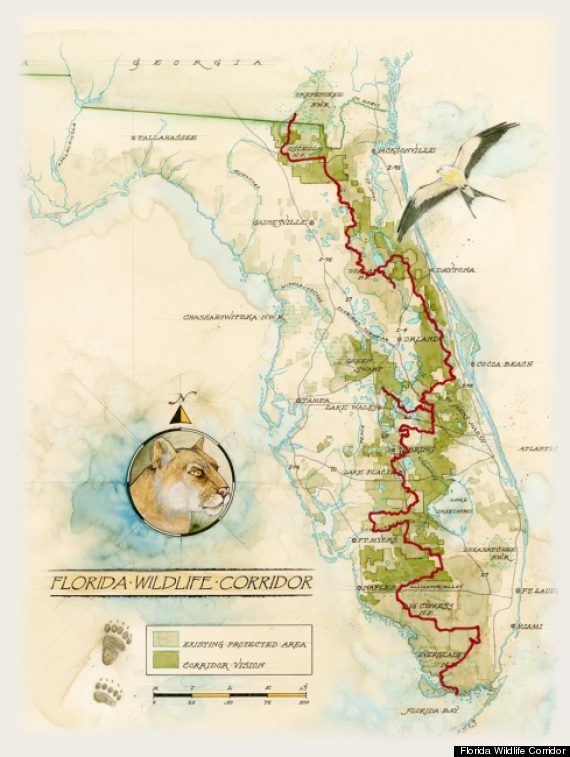America's political attention is focused on Florida this week, thanks to the state's upcoming presidential primary on Jan. 31. And while that attention will likely fade by Groundhog Day, the Sunshine State is enjoying its time in the sun for now.
On top of the media spotlight, Florida is reaping a windfall in mud-slinging money: Groups supporting various Republican candidates have already spent about $16 million on campaign ads in the state, part of a national trend funded by Super PACs. With a different candidate winning each state so far, Florida could finally provide some clarity in a long, rambling race.
Recent polls show Mitt Romney and Newt Gingrich virtually tied in Florida, and both are now filtering their attacks through the lens of local politics. That means a barrage of bickering about some of Florida's top political issues, namely home foreclosures, unemployment, immigration and even space travel.
But as the campaign trail winds through Florida, the candidates have spent relatively little time on another topic that always resonates there: the environment. The state is a mosaic of ecosystems with few parallels on Earth, yet humans have a spotty record of protecting it, spending much of the past century draining wetlands, diverting rivers and dividing habitats. Many people loathed places like the Everglades in the 1800s and early 1900s; Napoleon Broward was elected governor in 1904 on a promise to "drain that abominable, pestilence-ridden swamp."
Florida also has a long legacy of conservationism, though, and recent decades have seen more state politicians express an interest in local ecology, including some prominent Republicans like former Govs. Jeb Bush and Charlie Crist. As Jerry Karnas of the Everglades Foundation told the Associated Press this week, discussing wetlands restoration or offshore drilling with passionate voters has become a campaign-season tradition in Florida. "It's almost like eating fried cheese in Iowa," he says.
And now, on a very different campaign trail, four Floridians are hoping to channel that passion into action. The Florida Wildlife Corridor Expedition kicked off Jan. 17, sending the four explorers -- a biologist, a conservationist, a photojournalist and a filmmaker -- on a race of their own across 1,000 miles of dwindling wilderness. The 100-day journey aims to publicize the need for linked habitats in Florida, and ultimately for "a viable corridor from the Everglades to Georgia." This video unveiled the idea last year:
The project was inspired partly by Lawton Chiles, a former U.S. lawmaker from Florida who promoted his 1970 Senate bid by hiking 1,003 miles from Pensacola to Key West. Chiles won the election, although the Florida Wildlife Corridor Initiative says it's only borrowing his method, not his political motivation. Also citing conservationists John Muir and J. Michael Fay as inspirations, the FWCI offers this explanation:
The corridor addresses the fragmentation of natural landscapes and watersheds from the Everglades ecosystem north. Contributing to the fragmentation problem is a disconnect between perceptions of Floridians and the real need to keep natural systems connected. The Florida Wildlife Corridor is positioned to mend the perception gap through an education and awareness campaign that demonstrates the connection between landscapes and watersheds. If we show Floridians the panthers, bears, native cultures, ranchlands and rivers, and how they are all connected, then they can help us make the Florida Wildlife Corridor a reality.
One week into the expedition, the explorers are "in the middle of our route through the Everglades" and headed north to Big Cypress National Preserve, according to their official blog. The team is reportedly on schedule and food supplies are "holding up well," but it still has a long way to go, as this map shows (click to enlarge):

After the Everglades, the foursome will move north into Big Cypress, followed by the Everglades Agricultural Area and Okaloacoochee Slough. They'll then cross the Caloosahatchee River, trace Fisheating Creek toward Lake Okeechobee, and follow the Kissimmee River to the Kissimmee Chain of Lakes. After passing Orlando and Ocala National Forest, the last leg of their trip will traverse the "O2O" (Ocala to Osceola) corridor into Okefenokee National Wildlife Refuge.
The team is led by Carlton Ward Jr., a photojournalist and co-founder of the FWCI. Joining him are bear biologist Joe Guthrie, conservationist Mallory Lykes Dimmitt and cinematographer Elam Stoltzfus, who's filming the expedition for a documentary. In addition to reporting their progress via blog posts, photos and videos, the explorers have also issued an itinerary for the entire trip. If they can stay on schedule, they should arrive in Okefenokee by late April (just in time for Earth Day).
Of course, the GOP presidential race may already be in the bag by then, with 32 states having cast their votes. Americans will likely be paying far less attention to Florida at that point — unless another, quieter campaign trail can recapture their interest.
For an update on the team's first week, check out this video journal, posted January 24: